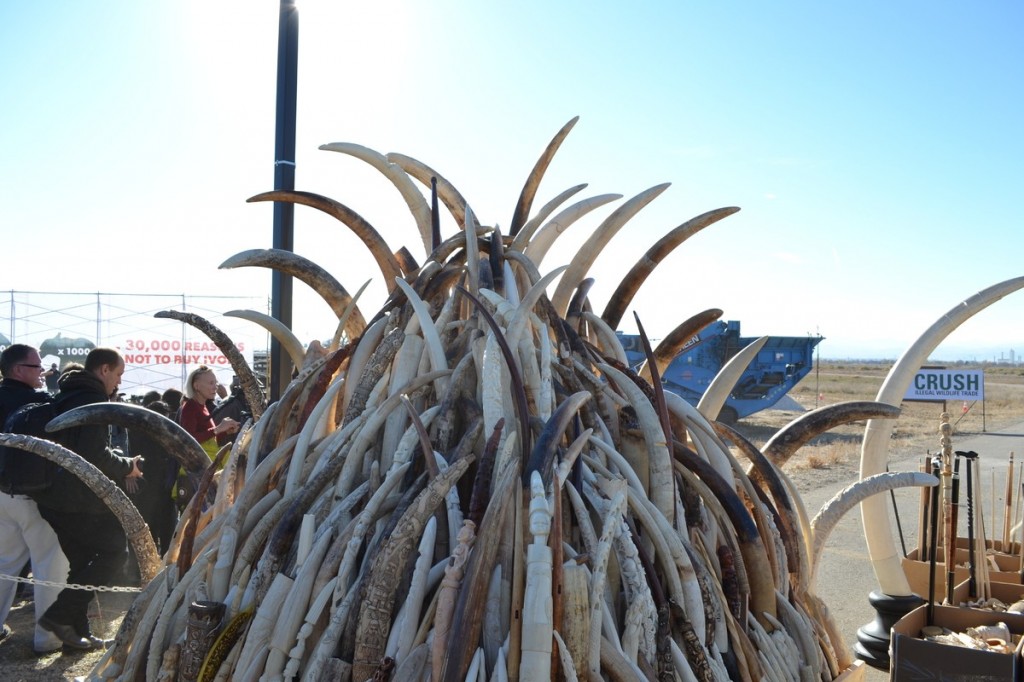Photocredit : Andrea Rael
The Obama administration fed six tons (5.4 tonnes) of ivory trinkets – all made from the tusks of dead elephants – into a giant blue industrial rock crusher on Thursday to demonstrate its resolve to end an illegal bn (£6bn) trade that is funding international crime and terrorism.
The highly symbolic act of destruction at a government repository in Denver is part of a broader crackdown by Barack Obama on blood ivory. Conservation groups fed the first load of ivory into the crusher.
But the crush of the grisly animal artefacts stops short of the complete ban on domestic ivory sales campaigners are demanding.
Campaign groups this week urged Obama to ban all domestic sales of ivory until there is sufficient recovery of African elephant populations.
“I am convinced more than ever of the necessity of destroying all stockpiles and ending trade in ivory in order to disrupt the world’s addiction to ivory,” said African Wildlife Foundation’s chief executive, Patrick Berrigan.
“Many countries, including China and the United States, still allow domestic trade, which has served only to sustain demand for ivory products while providing legalised cover for the illicit industry.”
The US bans the import and export of African ivory, but it is still legal to sell ivory that came into the country before 1989. Ivory is still available for sale in luxury shops and, increasingly, over the internet.
Wayne Pacelle, the president of the Humane Society of the United States, called on Obama to ban all domestic sales of ivory, and introduce stronger state and federal laws against ivory trafficking.
“We hear a lot about China, and concerns about the trade there are warranted, but the fact is, the United States is the second-largest market for ivory in the world,” he said in a statement.
“Ivory trade laws in the U.S. are riddled with loopholes… and smugglers take advantage of this deficiency.”
Other campaigners said it would be more effective for Obama to call on China and other countries to ban ivory sales.
The ivory pulverised on Thursday will likely be donated for use as a monument to slaughtered elephants, or as an exhibit about the trade, US Fish and Wildlife officials said.
They rejected the idea the crush would fuel demand for illegal ivory.
“This ivory would never be made available to the market,” the agency said in a statement. “Its destruction has no impact on the overall supply and does not create any incentive for poaching. By demonstrating our commitment to combat poaching and illegal trade, and to arrest and prosecute people who engage in these activities, we are providing a strong disincentive to poachers and wildlife traffickers.”
The crush is part of a broader crackdown by Obama on an illegal trade which has exploded over the last five years, fuelled by demand for ivory trinkets by a rising middle class in China and other countries in Asia.
Conservation groups said some 35,000 African elephants were slaughtered for their ivory last year – the highest figure since a ban on the legal ivory trade in 1989. They say they expect this year’s toll to rise even higher.
As demand for ivory outstrips supply, criminal syndicates and terrorist groups have moved in, using the huge profits to fund operations.
That elevated blood ivory into a security threat – the finding that pushed Obama to action.
A report from the director of national intelligence last September warned that high demand for ivory had pushed the price so high the illegal items were being used to finance terror operations, and were corrupting wildlife officials in east, central and southern Africa.
But conservation groups hope Thursday’s highly symbolic event will help crush any talk of allowing limited ivory sales. Conservation groups say a limited sale of ivory to China led to the current spike in elephant poaching.
“Our government is increasingly sending a clear message to ivory traffickers,” said Cristián Samper, president of the Wildlife Conservation Society.
Campaigners also say Obama’s support could help build momentum to a crush movement started by Kenya and Gabon.
guardian.co.uk © Guardian News & Media Limited 2010
Published via the Guardian News Feed plugin for WordPress.


